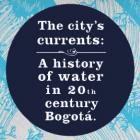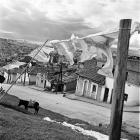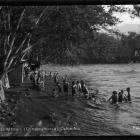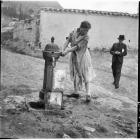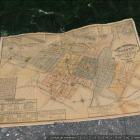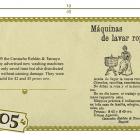Authors
The virtual exhibition “The City’s Currents: A History of Water in 20th-Century Bogotá” is a collaboration of the Rachel Carson Center for Environment and Society and the Línea de Historia Ambiental, the Environmental History Research Group of the Department of History at the Universidad Nacional de Colombia in Bogotá. The exhibition was researched and authored by historians Stefania Gallini, Laura Felacio, Angélica Agredo, and Stephanie Garcés. However, it would not have been possible without the collaborative work of a multidisciplinary group of graphic designers, architects, cartographers, musicians, translators, and editors to whom we express our gratitude.

Authors of the virtual exhibition, with the Eastern Mountains of Bogotá in the background. From the left: Stephanie Garcés, Laura Felacio, Stefania Gallini, Angelica Agredo.
Authors of the virtual exhibition, with the Eastern Mountains of Bogotá in the background. From the left: Stephanie Garcés, Laura Felacio, Stefania Gallini, Angelica Agredo.
All rights reserved. 2014. Courtesy of Andrés Felipe Nieto Quintero.
The copyright holder reserves, or holds for their own use, all the rights provided by copyright law, such as distribution, performance, and creation of derivative works.
Stefania Gallini is an environmental and Latin American historian at the Universidad Nacional de Colombia in Bogotá, where she coordinates the Environmental History Research Group of the Department of History. She graduated with a degree in political science from the Universitá degli Studi di Milano (1995), took a master’s degree in area studies at the University of London (1998), and was granted a PhD in Latin American history from the Universitá degli Studi di Genova (2002). She is author of the book Una historia ambiental del café en Guatemala: La Costa Cuca entre 1830 y 1902 (Guatemala: AVANCSO, 2009), which in 2010 was awarded the Elinor Melville Prize for Latin American Environmental History by the Conference of Latin American History. In the same year she spent time in Munich as a Carson Fellow at the Rachel Carson Center for Environment and Society working on an ongoing project on waste history in Bogotá. She is a founding member of Latin American and Caribbean Society of Environmental History (SOLCHA) and joint president from 2012 to 2014. She is also active in the European Society for Environmental History (ESEH) and International Consortium of Environmental History Organizations (ICEHO). Besides environmental history and Latin American history, digital humanities is her third area of interest. She has published on these areas in academic journals and has edited books in Latin America, the US, UK, and Italy.
Laura Felacio graduated with a degree in history from the Universidad Nacional de Colombia (2009), and is currently pursuing a master’s degree in urbanism at the same university. She has been a member of the Environmental History Research Group of the Department of History at the Universidad Nacional de Colombia since 2009. Her research interests include environmental history, urban history, and social history. She is author of articles in Colombian academic journals, such as “La Empresa Municipal del Acueducto de Bogotá: Creación, logros y limitaciones, 1911–1924” (Anuario Colombiano de Historia Social y de la Cultura 38, no. 1 (2011): 109–40), “Memoria, territorio y oficio alfarero: La memoria colectiva en los barrios del Cerro del Cable” (Revista Nodo 6, no. 11 (2011): 77–98), and “La huelga de las telefonistas: Condiciones, problemas y manifestaciones de las mujeres obreras a comienzos del siglo XX en Bogotá” (Ciudad Paz-ando 5, no. 1 (2012): 31–48).
Angélica Agredo is a historian from the Universidad Nacional de Colombia (2014). Her fields of interest are environmental history and the history of science, technology and medicine. She has been associated with the Environmental History Research Group of the Department of History at the Universidad Nacional de Colombia since 2012. Her undergraduate dissertation, entitled “Naturaleza hostil y ferrocarriles: El abandono del sistema férreo en Colombia. El caso del Ferrocarril Troncal de Occidente en el invierno de 1973,” obtained the award “Best Undergraduate Dissertation in History, Version XXIII, 2014” by the Universidad Nacional de Colombia. After graduating with honors, she received a full scholarship to study at King’s College London where she is currently attending the master of arts program in Science, Technology and Medicine in History.
Stephanie Garcés is a historian from the Universidad Nacional de Colombia (2014). She has been associated with the Environmental History Research Group of the Department of History at the Universidad Nacional de Colombia since 2012. Her work is focused on the development of digital humanities and the use of new tools for web researches on this field. She manages the blog De Reformas y Soldados, which focuses on the relationship between war and religion during the modern age.







